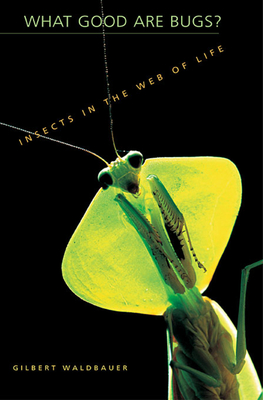

 Harvard University Press
Harvard University Press
What Good Are Bugs?: Insects in the Web of Life


Key Metrics
- Gilbert Waldbauer
- Harvard University Press
- Paperback
- 9780674016323
- 9.18 X 6.34 X 0.98 inches
- 1.29 pounds
- Nature > Animals - Insects & Spiders
- English
 Secure Transaction
Secure TransactionBook Description
We shriek about them, slap and spray them, and generally think of insects (when we think of them at all) as pests. Yet, if all insects, or even a critical few, were to disappear--if there were none to pollinate plants, serve as food for other animals, dispose of dead organisms, and perform other ecologically essential tasks--virtually all the ecosystems on earth, the webs of life, would unravel. This book, the first to catalogue ecologically important insects by their roles, gives us an enlightening look at how insects work in ecosystems--what they do, how they live, and how they make life as we know it possible.
In What Good Are Bugs? Gilbert Waldbauer combines anecdotes from entomological history with insights into the intimate workings of the natural world, describing the intriguing and sometimes amazing behavior of these tiny creatures. He weaves a colorful, richly textured picture of beneficial insect life on earth, from ants sowing their hanging gardens on Amazonian shrubs and trees to the sacred scarab of ancient Egypt burying balls of cattle dung full of undigested seeds, from the cactus-eating caterpillar (aptly called Cactoblastis) controlling the spread of the prickly pear to the prodigious honey bee and the sanitary officers of the field--the fly maggots, ants, beetles, and caterpillars that help decompose and recycle dung, carrion, and dead plants. As entertaining as it is informative, this charmingly illustrated volume captures the full sweep of insects' integral place in the web of life.
Author Bio
Gilbert P. Waldbauer (1928- ) served as Professor of Entomology (1960-1995) at the University of Illinois. He studied agricultural pests, pest management, mimicry, and insect mating but he also wrote books on biology and entomology for the general public. Throughout his career Professor Waldbauer worked internationally as a researcher and government consultant.
Gilbert P. Waldbauer was born on April 18, 1928, in Bridgeport, Connecticut. He served in the U.S. Army Honor Guard to General Douglas MacArthur from 1946 to 1947, and was stationed in Tokyo, Japan, during this time. Upon returning to the U.S., Waldbauer completed his Bachelor of Science degree in entomology in 1953 at the University of Massachusetts. He then earned his Master of Science and Ph.D. in entomology at the University of Illinois at Urbana-Champaign, in 1956 and 1960, respectively.
Waldbauer served as a professor of entomology (1960-1995). He toured the country speaking about natural history for the Massachusetts Conservation Council (1952-1953). He was an associate member of the Center of Zoonoses Research (1963-1964) and a research affiliate in entomology at the Illinois State Natural History Survey (1970). Internationally, he was a visiting scientist at the Instituto Colombiano Agropecuario in Palmira, Columbia (1971); a senior scientist at the International Rice Research Institute in the Philippines (1978-1979); and a USAID consultant to the Pakistan Agricultural Research Council in Islamabad, Pakistan (1985).
Professor Waldbauer is nationally and internationally recognized for his research into the adaptive significance of individual and group behavior among insects, including cecropia moths, bean leaf beetles, whiteflies, South American stink bugs, and corn earworms. During his career, Waldbauer authored and co-authored more than 100 academic articles. He also served as a reviewer for the National Science Foundation, and he was awarded grants from U.S. Department of Agriculture and the National Geographic Society for his research on agricultural pests and pest management.
Since his retirement, Waldbauer has published several popular science books, including Insects through the Seasons (1996), The Handy Bug Answer Book (1998), Birder's Bug Book (1998), Millions of Monarchs, Bunches of Beetles: How Bugs Find Strength in Numbers (2000), What Good are Bugs? Insects in the Web of Life (2003), Insights from Insects: What Bad Bugs Can Teach Us (2005), A Walk around the Pond: Insects in and over the Water (2006), and How Not to Be Eaten (2012).
Source: University of Illinois Archives
Videos


Community reviews
Write a ReviewNo Community reviews